Iran’s execution spree continues with eight more prisoners hanged
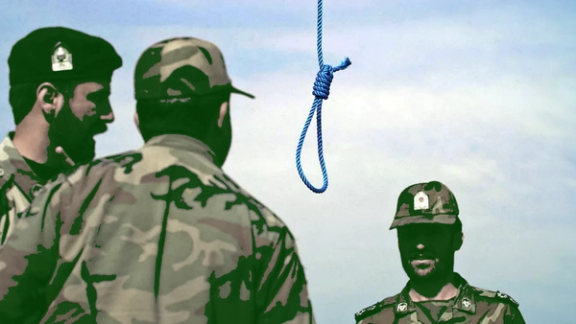
The Iranian government executed at least eight more prisoners early Monday morning, according to reports from human rights groups, with hundreds already hanged in 2024.

The Iranian government executed at least eight more prisoners early Monday morning, according to reports from human rights groups, with hundreds already hanged in 2024.
This latest round of executions, which took place in Yazd and Shiraz prisons, is part of a broader trend that has seen the number of state-sanctioned killings skyrocket in 2023 and 2024, drawing international condemnation and sparking renewed calls for an end to the death penalty in Iran.
The systematic execution of prisoners has become a routine practice, drawing condemnation from international human rights organizations. As the Iranian government intensifies its crackdown on dissent, political prisoners in the women's ward of Evin Prison have vowed to continue their fight against the death penalty, despite the brutal pressures they face.
Haalvash, a website dedicated to Baluch community news, reported that five individuals were executed in Yazd Prison. These included three Baluch citizens and two Afghan nationals, all condemned on charges related to drugs or murder. The Oslo-based Iran Human Rights organization confirmed that three more people were executed in Adelabad Prison in Shiraz too.
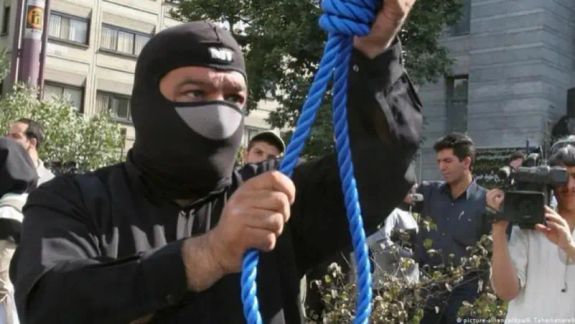
Amnesty International says 853 people were executed in Iran in 2023, marking the highest number of executions in the country in the last eight years. This figure represents a 48% increase from 2022 and a 172% spike from 2021. Iran's Islamic government executed 345 people this year, until August 9. The only time when there were fewer execution was during election periods in March and June.
This wave of executions is part of a broader strategy by the Iranian government to instill fear and suppress any form of resistance. Since the nationwide protests in 2022, triggered by the death of Mahsa Amini in morality-police custody, Iran has weaponized the death penalty as a means of crushing dissent and tightening its authoritarian grip on the nation.
Meanwhile, Maryam Yahyavi, a political prisoner in Evin Prison, confirmed reports of a recent raid by guards on women protesting death sentences. In a letter published Sunday, Yahyavi described the violent crackdown: "They gathered all their strength in their arms and struck us down."
The women had gathered as part of the “No to Executions Tuesdays” campaign, protesting the execution of Reza Rasaei, a 34-year-old Iranian arrested during the 2022 anti-government protests in Kermanshah. Rasaei was executed earlier this month, and those who dared to protest his death faced repercussions, including beatings and a ban on visits and phone calls.
Despite the measures, the resolve of political prisoners remains unshaken. Yahyavi stressed that their opposition to the death penalty would continue unabated.
Another political prisoner, Golrokh Iraee, also emphasized in a letter published Monday that all citizens, regardless of their political stance, must condemn and actively oppose the death penalty.
The UN High Commissioner for Human Rights, Volker Türk, recently expressed deep concern over the ongoing executions in Iran.
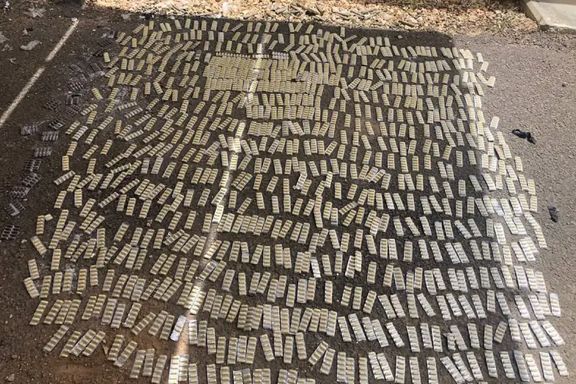
Over the past decade, the Middle East has witnessed a surge in drug manufacturing and trafficking, largely fueled by the Syrian conflict, with Iran proxies playing a major role.
The security vacuum and collapse of government control have turned the country into a fertile ground for this illicit trade, with Syria and Iran establishing it as a central hub for drug production and distribution in the region.
Captagon, a drug combining amphetamines and caffeine, plays a pivotal role in the illicit drug trade orchestrated by the two countries. These allies appear to have strategically identified Captagon as the most effective substance for penetrating markets in Saudi Arabia, the UAE, and other Arab states bordering the Persian Gulf, owing to its low production cost and widespread availability.
As the world's leading producer of Captagon, Syria in all likelihood uses the drug trade as a crucial revenue stream for Bashar al-Assad's regime. Smuggling operations, facilitated by Iran-linked militias, channel Captagon into Persian Gulf countries, turning this trade into more than just an illicit economic activity – serving as a major financial lifeline for numerous armed groups, further fueling violence and instability across the region.
Iran-aligned militant groups in Lebanon and Iraq, including Hezbollah, Kata'ib Hezbollah, and Asa'ib Ahl al-Haq, play a significant role in smuggling Captagon, capitalizing on their influence over local governments. Despite concerted efforts by Jordan, Saudi Arabia, and the UAE to combat the Captagon trade—ranging from airstrikes to targeting traffickers and their warehouses—these measures have had limited success in curbing the flow of the drug.
Addressing the growing challenge of Captagon may require Arab countries to consider adopting new strategies, such as shifting the focus from punishment to treatment for users, enhancing law enforcement practices, and improving intelligence-sharing among regional nations.
The situation could also benefit from increased support and assistance from the United States. With the looming threat of Captagon being overtaken by even more destructive substances like methamphetamine, there is a sense that efforts to combat drug trafficking may need to be intensified. This could include targeting methamphetamine labs, cutting off supply chains, and closing avenues that might exacerbate the drug problem.
The rise of Captagon
Since the onset of the Syrian conflict in 2011, the country has experienced a severe decline in security and a loss of government control across vast regions. This security vacuum has allowed warlords and armed groups to take over key areas, exploiting them for various illicit activities. In the absence of government oversight, drug production factories have rapidly proliferated throughout Syria. These facilities have become major producers of Captagon, often referred to as the "poor man's cocaine," a drug containing amphetamines, caffeine, and theophylline.
Numerous reports suggest that Syria is responsible for producing around 80% of the world's Captagon, solidifying its status as the undisputed "Captagon capital." The Syrian regime stands accused of actively facilitating the production and export of Captagon to generate economic profits, particularly in the face of international sanctions, though the government continues to deny these allegations.
These factories are often operated by armed groups affiliated with the Syrian regime or supported by Iran, further complicating efforts to combat the Captagon trade. The drug trade has evolved into a crucial source of funding for military activities within Syria, exacerbating the conflict and prolonging its duration. Captagon is primarily smuggled into Jordan and Gulf countries, where authorities are intensifying efforts to curb the trade through stricter laws and large-scale seizures. The impact of the Captagon trade, however, extends well beyond Syria's borders, threatening the social and economic security of neighboring countries and the broader Persian Gulf region.
Warlords and drug lords
Warlords in Syria have become key organizers of the manufacturing and distribution networks within the drug trade. Captagon has become one of the most important sources of income for these warlords, providing them with the necessary funding to continue their military and political operations.
These chieftains have established a complex network of factories and logistical routes to smuggle drugs out of Syria. Their networks include alliances with other armed groups, human traffickers, and external parties, making tracking and stopping their operations extremely difficult. The operations are often managed by individuals with military and political influence in their areas of control.
Iran, playing a crucial role, uses the drug trade as part of a broader strategy to destabilize the region, exploiting weak security apparatuses and ongoing wars to expand its influence. Tehran’s proxy militias use profits from the Captagon trade to fund their terrorist and military activities, further complicating the security situation in the region.
Captagon is predominantly smuggled into countries such as Saudi Arabia and the UAE through intricate land and sea routes. The regular seizure of hundreds of millions of Captagon pills underscores the vast scale of production and the significant demand for this drug in the region.
Exacerbating violence and instability across the region, the implications of the Captagon trade naturally reach far beyond Syria's borders. This makes the fight against the Captagon trade a pressing regional security challenge, necessitating international cooperation and coordinated efforts among the affected countries.
Target markets
Driven by their dense populations and robust economies, the countries bordering the Persian Gulf represent a lucrative market for drug trafficking networks – making them prime targets for illicit activities.
Iran also plays a pivotal role in this context. International reports implicate Iran as a key player in smuggling networks, with drugs being routed through Iranian territory to reach Persian Gulf countries.
In response to the growing drug trafficking challenges, particularly from sources like Lebanon and Syria, Persian Gulf countries have taken several measures, such as banning imports from these regions and tightening inspection procedures at border crossings. The formation of joint task forces aimed at dismantling smuggling networks and prosecuting offenders on an international scale reflects a concerted effort to address the issue. However, the escalating Captagon trade presents significant obstacles, with corruption, strained resources, and the complexity of smuggling routes complicating enforcement efforts.
Despite ongoing security campaigns, the difficulty in curbing the trade underscores the challenges these countries face. There is a noticeable focus on enhancing security coordination with neighboring states and developing comprehensive strategies to combat drug trafficking. This includes investment in modern technology and increased cooperation with international organizations for intelligence sharing. The multifaceted approach highlights the complexity of the issue and the need for sustained, collaborative efforts to mitigate its impact.
Impact on healthcare systems, communities
The drug trade, particularly the proliferation of Captagon, has profound impacts on communities in Persian Gulf countries and Syria. Users face severe health consequences, including addiction, loss of functional capacity, and a rise in drug-related crime. The financial strain on healthcare systems, as they attempt to manage the fallout, further exacerbates the burden on public institutions.
In light of these challenges, there is a growing recognition of the need to bolster preventive and treatment strategies to mitigate the effects of addiction on communities.
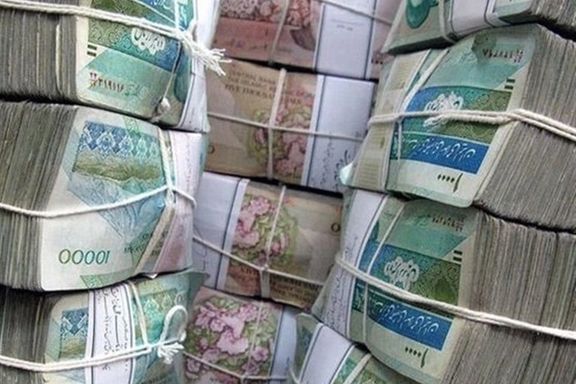
One key indicator of Iran’s prolonged economic struggles is the government’s reliance on borrowing from its own banks and printing money, a practice that intensified after the re-imposition of U.S. sanctions in 2018.
Iran's state debt to the banking system has surged by 138% over the past three years, reaching 15,600 trillion rials (approximately $32 billion at the official exchange rate and $26 billion at the open market rate), according to Central Bank statistics.
During his presidential campaign, Ebrahim Raisi—who died in a helicopter crash on May 19, 2024—had pledged not to borrow from the country's banking system. However, Central Bank data reveals that government borrowing from banks nearly doubled, increasing 2.5 times since Raisi assumed office in August 2021.
Raisi administration officials repeatedly claimed that the administration ceased borrowing from the Central Bank. However, statistics from the institution show that government debt to the Central Bank has not only continued but surged by 72% year-on-year as of June 2024 in the last year of his presidency.
In addition, the government has intensified its indirect borrowing from the Central Bank. This approach involves the Central Bank providing substantial loans to domestic banks, enabling the government to borrow extensively from these institutions alongside its direct borrowing.
For example, borrowing by domestic banks from the Central Bank in June 2024 was 2.7 times higher than in the same month the previous year and nearly 5.5 times higher compared to when President Raisi's administration took office.
During this period, the Central Bank lent 5,440 trillion rials (approximately $9 billion at the open market exchange rate) to the country’s banks, which then loaned 6,260 trillion rials to the government.
The potential consequences remain uncertain, especially given that the Iranian rial has lost more than half of its value over the past three years. The cycle of loans between the Central Bank and domestic banks, eventually funneling to the government, could have significant repercussions. A substantial portion of the funds received by the government has effectively diminished in value due to the severe devaluation of the rial during this period.
Moreover, seven of Iran's major banks have collectively accumulated losses totaling 4,600 trillion rials, casting doubt on their future stability.
In summary, despite the Raisi administration's pledge to avoid borrowing, the government has taken out loans exceeding 9,000 trillion rials from the Central Bank and other domestic banks over the past three years. Most of this borrowing was done directly by the government, with the remainder undertaken by state-owned companies and organizations.
The primary driver of this extensive borrowing is the persistent and severe budget deficit. While the Central Bank has stopped publishing reports on the government’s budget performance since June 2022, its latest available data indicates that in the first year of Raisi’s presidency, the government faced an operational deficit of approximately 4,730 trillion rials ($8 billion). Even after accounting for the sale of capital assets, the budget deficit remained at 2,160 trillion rials ($3.6 billion).
The government's reliance on borrowing to cover budget deficits is not unique to the Raisi administration; it has been a common practice since the imposition of U.S. sanctions in 2018, dating back to President Hassan Rouhani's tenure.
Liquidity and Inflation
The extensive borrowing in recent years has resulted in a staggering liquidity level of 83,540 trillion rials (approximately $139 billion at the open market exchange rate), which has doubled since 2021. This surge in liquidity has contributed to an annual inflation rate exceeding 40% in Iran in recent years.
It’s important to note that only a few countries worldwide experience such high and persistent inflation. For context, the global average inflation rate last year was 6.8%, while Iran’s was 41.5%. The relatively high global inflation rate is largely attributed to Russia’s invasion of Ukraine and ongoing tensions in the Middle East; otherwise, it has typically hovered around 3% in previous years. The International Monetary Fund (IMF) forecasts global inflation to decrease to 4.5% next year, while Iran's inflation is projected to remain high at 32.5%.
Additionally, the National Development Fund of Iran reports that the government has borrowed $100 billion from this institution and is currently unable to repay it. The total debt owed by the government to banks and the National Development Fund now amounts to three years' worth of the government's general budget, with no clear plan for how these debts will be settled.
Beyond these borrowings, the government also owes significant amounts to private companies across various sectors, including construction, pharmaceuticals, private electricity plant owners, and wheat farmers.
According to the Central Bank's report, the Raisi administration has managed to settle approximately $4.5 billion in external debt. As of June this year, Iran's foreign debt stands at around $4.363 billion, with commitments to repay $2 billion of this debt in the short term and the remainder in the medium term.
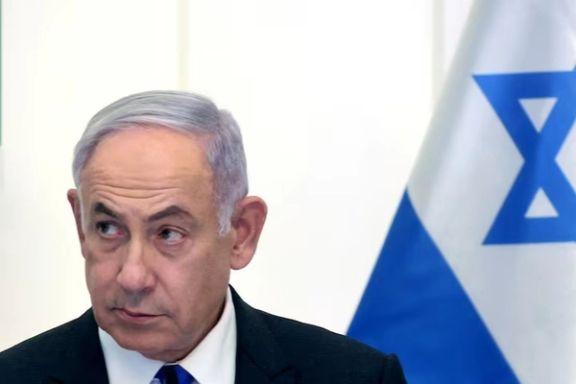
Prime Minister Benjamin Netanyahu has dared Iran and its Lebanese proxy group, Hezbollah, to attack Israel and face the consequences.
Speaking at the start of a weekly cabinet meeting on Sunday, Netanyahu issued a warning to Iran and Hezbollah, signaling Israel's readiness to defend itself against any threats from these adversaries.
"We are determined to defend ourselves, and we are also determined to extract a very heavy price from any enemy that dares to attack us, from any theater," Netanyahu stated.
He also underscored Israel’s commitment to its security principles, which he said will remain non-negotiable despite the complex nature of the peace talks. “We are conducting very complex negotiations,” Netanyahu said. “But I want to emphasize: We are conducting negotiations, and not give-and-give. There are areas where we can show flexibility, and there are areas where we can’t show flexibility — and we are standing firm on them. We know quite well how to distinguish between the two.”
These comments come as Israel continues to engage in indirect negotiations with Hamas, mediated by Qatar, the United States, and Egypt. The talks, held in Doha over the past week, are aimed at securing the release of Israeli hostages taken by Hamas during the October 7 attacks that killed approximately 1,200 Israelis. However, significant gaps remain between the two sides, particularly on the key issues of the Philadelphi Corridor, the Rafah Crossing, and the deployment of Israeli Defense Forces (IDF) in Gaza if an agreement is reached.
Netanyahu’s firm stance is consistent with the outline laid out by the White House in May, which has since been the basis for Israel’s negotiating position. Central to these principles is Israel's demand for control over critical border areas to prevent the smuggling of weapons into Gaza and ensure its long-term security. This demand has been a major sticking point in the talks, with Hamas refusing to agree to any arrangement that would allow Israeli forces to remain in Gaza after a potential ceasefire.
Despite the complexities of the negotiations, there has been some optimism among mediators. US Secretary of State Antony Blinken, who arrived in Israel on Sunday for another round of talks, is expected to push for progress, especially since Joe Biden urgently needs the ceasefire as a legacy of his presidency.
However, Hamas has already cast doubt on the prospects of a breakthrough. In a statement released shortly after Blinken's arrival, the militant group accused Netanyahu of setting new conditions to deliberately sabotage the negotiations. “We hold Netanyahu fully responsible for thwarting the mediators’ efforts and obstructing an agreement,” Hamas declared.

Meanwhile, the situation on the ground remains volatile. Israeli fighter jets struck a Hezbollah rocket launcher in southern Lebanon on Sunday evening, in response to an attack on the Upper Galilee. The Israeli Defense Forces (IDF) have also reported ongoing rocket fire from Lebanon into northern Israel, further escalating the conflict with Hezbollah, an Iranian-backed militant group allied with Hamas.
The broader regional implications of the conflict are becoming increasingly apparent. Iran, which has been a key supporter of both Hamas and Hezbollah, has threatened retaliation following the assassination of senior Hamas and Hezbollah figures in Tehran and Beirut, which it attributes to Israel. This escalation comes at a time when the international community is growing increasingly concerned about the potential for the conflict to spill over into a broader regional war.
Iran has reportedly postponed its retaliatory strike on Israel to avoid derailing the ceasefire talks aimed at ending the Gaza war. However, the Islamic Republic has tried to avoid expressing public support for the negotiations and even downplayed the US-led mediation efforts arguing that Washington cannot be an “impartial” mediator as it backs Israel.
Iranian authorities are also skeptical about the support expressed by some Western countries for the people of Israel. A report by the Tehran Times, an Iranian newspaper fully owned and controlled by the government, even claimed that France, Germany, and Britain are considering recognizing Palestine as a state, contingent on significant concessions from Iran, including its recognition of Israel and a halt to support for resistance groups in the region.
“The initiative proposed by Paris and endorsed by London and Berlin aims to offer additional protections for Israel but does not establish any conditions to safeguard Palestinians against Israel's apartheid policies in the occupied territories, its massacres in Gaza, the abuse of Palestinian prisoners, or the growing number of illegal settlements in the West Bank,” the report added.
If the initiative is implemented, wrote the Tehran Times, the European trio will join Norway, Ireland, and Spain, who earlier this year became the latest group of European countries to recognize Palestine as a state.
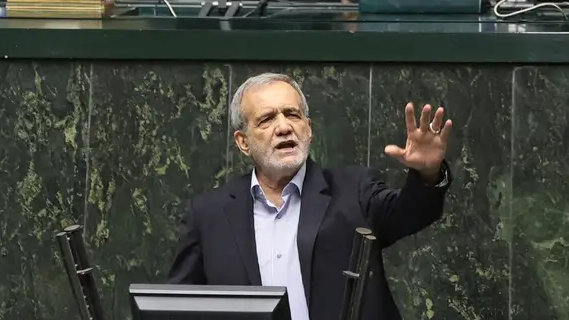
Growing criticism of Masoud Pezeshkian’s cabinet selections has sparked a wave of public distrust in the Islamic Republic’s political process, with citizens accusing officials of deceiving the electorate.
The backlash follows remarks from Iranian lawmaker Qasem Osmani, who acknowledged during Saturday’s parliamentary session, which marked the first day of cabinet approval debates, that people feel betrayed by the election results.
Osmani, a Pezeshkian supporter, directly criticized Pezeshkian during the session, accusing him of abandoning the electorate after the elections. "People say you deceived us in the elections," Osmani said. "You spoke about our pains, we thought you sympathized, but after the elections, you forgot all our pains."
Iran International asked its audience for their thoughts on Osmani’s statement. The responses reveal widespread frustration, with citizens viewing the entire political system as fundamentally deceptive.
One citizen responded with a voice message, stating, "The Islamic Republic regime is founded on corruption, and the corrupt are running it."
Another citizen stated, "Anyone who has voted in any election in the Islamic Republic has been deceived."
A third citizen traced the roots of this deception to the early days of the Islamic Republic, stating, “Ruhollah Khomeini, the founder of the Islamic Republic, began deceiving the people in 1979,” a pattern that, they believe, persists to this day.
A fourth citizen expressed even deeper disillusionment, arguing that the Islamic Republic’s deceit extends beyond just elections. "To say they’ve been deceived is an understatement; it’s much worse than that," he remarked.
"The Islamic Republic is committed to nothing but fulfilling its own desires, which have always been in direct opposition to the will of the people."
Pezeshkian, who was supported by the 'reformist' wing of Islamic politicians, promised voters that his government will be composed of experts and that he would address some of the electorate's main grievances. But when he announced his cabinet, people realized it was stacked with the same former officials and IRGC generals.
The parliamentary debates over Pezeshkian's cabinet nominees are set to continue through Wednesday, August 21.
As the debates unfold, the widening divide between the state and the people highlights the escalating tension, raising critical questions about the future direction of the Islamic Republic. Pezeshkian’s leadership, shaped by the directive of Supreme Leader Ali Khamenei and emerging from a heavily boycotted election, faces increased scrutiny amid ongoing anti-regime sentiment.
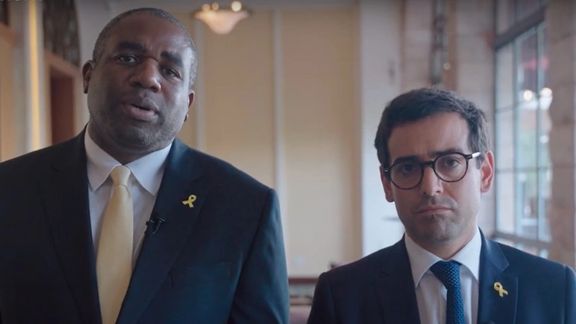
The British and French foreign ministers have warned about the mounting danger of a full-scale regional conflict due to Iran's escalatory rhetoric, calling on all parties to show restraint.
In a joint op-ed published in the Guardian on Saturday, UK Foreign Secretary David Lammy and French Foreign Minister Stéphane Séjourné stress that Iran's threats of escalation could trigger a wider and more destructive war in the Middle East.
“Iranian threats of further escalation mean the risks of a full-scale regional war are rising,” the ministers cautioned. They described the current situation as a “destructive cycle of violence,” with the potential for a single miscalculation to ignite a deeper and more unmanageable conflict.
Since the assassination of Hamas leader Ismail Haniyeh in Tehran on July 31, Iran has been threatening retaliation against Israel. However, recent media reports suggest that internal divisions within Iran are causing hesitation regarding further escalation. Additionally, it appears that pressure from the Biden administration may be influencing Iran to reconsider its stance.
The European ministers underscored the implications any Iranian aggression could have, potentially undermining ceasefire negotiations related to Gaza. They emphasized that “it’s never too late for peace” and warned that an all-out regional conflict would serve no one's interests. "All parties must exercise restraint and focus on diplomatic solutions," they argued.
The situation in Gaza remains critical, with the ongoing war leading to civilian casualties. Hostages taken by Hamas during the October 7 attack are still held captive, including several French and British nationals. Meanwhile, the conflict between Israel and Hezbollah has intensified, further complicating the regional stability.
In response to these threats, the foreign ministers visited Israel in a joint diplomatic mission, marking the first time in over a decade that British and French top diplomats traveled together to the region. Their visit to Israel underscores a renewed commitment to collaborative action aimed at enhancing regional and European security.
As permanent members of the UN Security Council, the UK and France called for engagement with US-led diplomatic discussions, emphasizing the importance of adhering to UN Security Council Resolution 1701.
The ministers also acknowledged the role of American, Egyptian, and Qatari mediators in facilitating ongoing negotiations. They stressed that only “a deal can restore communities’ sense of security. Only a deal can open up the space for progress towards a two-state solution – the only long-term route to safety, security and dignity for Israelis and Palestinians alike.”
“There can be no delays or excuses,” the foreign ministers declared. “We must all come together and reconnect in the interests of peace.”